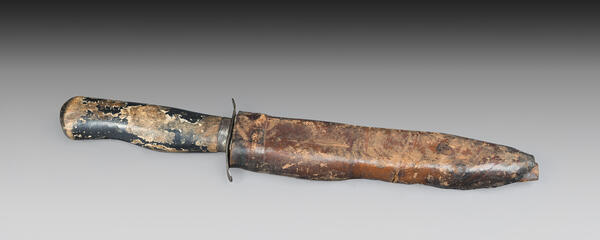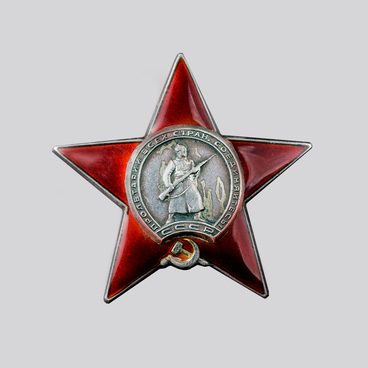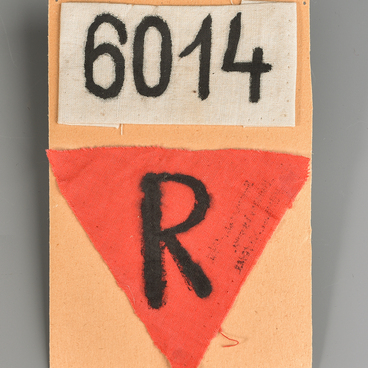When the Soviet troops started to deploy short-barrel automatic weapons omitting bayonets, an HP-40 knife (scout knife) was additionally adopted.
The wooden handle and scabbards were painted black so that the knife be hidden in the darkness from the enemy.
The most distinctive feature of this weapon was the S-shaped crossguard with unconventional bend: the guard stop is bent not towards the hilt, but vice versa to the blade.
This inverted guard was needed to make it convenient to hold the knife with the blade downward. It was recommended to carry the weapon on the left side of the belt at an angle of 30 degrees, with the handle turned to the right.
The combat knife exhibited in the ‘Remembered Today and Always’ belonged to Ilya Limonov, Hero of the Soviet Union, a native of Chuvashi village of Kirovo-Chepetsk District, Kirov Oblast. He was off to the Great Patriotic War in June 1943.
By September 1943, the junior lieutenant Limonov was in charge of the machine-gun platoon of the 957th rifle regiment, the 309th rifle division, the 40th army of the Voronezh front. Limonov distinguished himself in fights for Dnepr.
His platoon was the first to cross the river and actively engaged in beachhead assault and retention fights. As a result of military clashes, only 85 soldiers 500 Red Army men survived.
After breaking six fierce counterattacks, only 42 fighters under Limonov’s command remained in the ranks, and most of them were wounded. However, in the face of all the difficulties, the unit had defended the position before the main troops crossed.
On October 23, 1943, the junior lieutenant Limonov was awarded the title of Hero of the Soviet Union for ‘exemplary combat mission management at the front against German invaders and the displayed courage and heroism’. He was awarded the Order of Lenin and the ‘Gold Star’ medal.
After the war, Limonov was transferred off in the reserve. In 1948, he graduated from the Kirov Mechanics and Technology College, and thereafter he worked at the Kirov Tire Plant.
In June 1951, Limonov was called up for military service, but in 1955 for health reasons was released from active service again. He lived and worked in the Tomsk region and died in 1991. He was buried at Severskoye municipal cemetery’s Walk of Fame.
The wooden handle and scabbards were painted black so that the knife be hidden in the darkness from the enemy.
The most distinctive feature of this weapon was the S-shaped crossguard with unconventional bend: the guard stop is bent not towards the hilt, but vice versa to the blade.
This inverted guard was needed to make it convenient to hold the knife with the blade downward. It was recommended to carry the weapon on the left side of the belt at an angle of 30 degrees, with the handle turned to the right.
The combat knife exhibited in the ‘Remembered Today and Always’ belonged to Ilya Limonov, Hero of the Soviet Union, a native of Chuvashi village of Kirovo-Chepetsk District, Kirov Oblast. He was off to the Great Patriotic War in June 1943.
By September 1943, the junior lieutenant Limonov was in charge of the machine-gun platoon of the 957th rifle regiment, the 309th rifle division, the 40th army of the Voronezh front. Limonov distinguished himself in fights for Dnepr.
His platoon was the first to cross the river and actively engaged in beachhead assault and retention fights. As a result of military clashes, only 85 soldiers 500 Red Army men survived.
After breaking six fierce counterattacks, only 42 fighters under Limonov’s command remained in the ranks, and most of them were wounded. However, in the face of all the difficulties, the unit had defended the position before the main troops crossed.
On October 23, 1943, the junior lieutenant Limonov was awarded the title of Hero of the Soviet Union for ‘exemplary combat mission management at the front against German invaders and the displayed courage and heroism’. He was awarded the Order of Lenin and the ‘Gold Star’ medal.
After the war, Limonov was transferred off in the reserve. In 1948, he graduated from the Kirov Mechanics and Technology College, and thereafter he worked at the Kirov Tire Plant.
In June 1951, Limonov was called up for military service, but in 1955 for health reasons was released from active service again. He lived and worked in the Tomsk region and died in 1991. He was buried at Severskoye municipal cemetery’s Walk of Fame.



